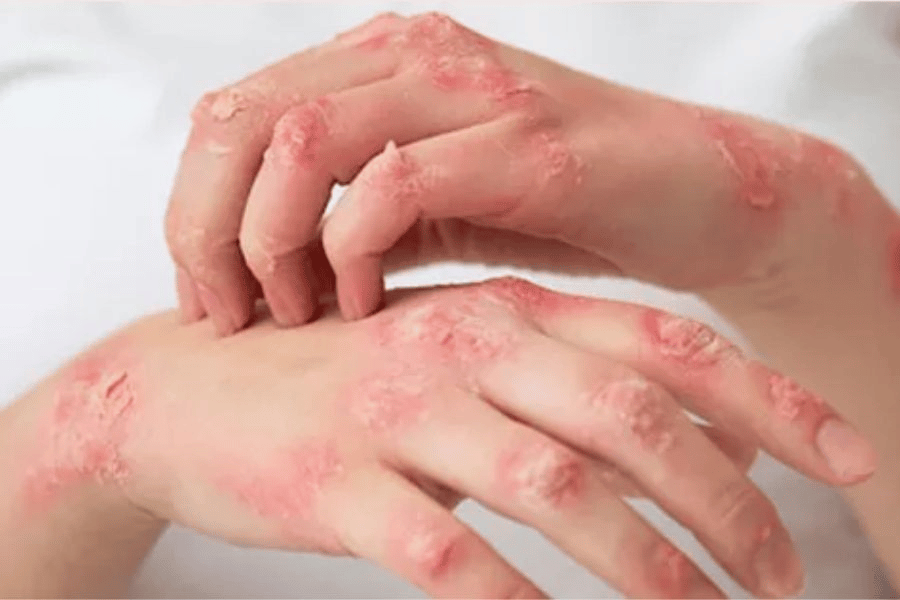Dementia With Lewy Bodies
Overview

Dermatomyositis is a medical condition that is characterized by muscle weakness, which can occur abruptly or gradually over a few weeks or months.
This weakness can hinder normal activities such as raising arms, standing up from a seated position, and climbing stairs.
In addition to muscle weakness, a characteristic rash may appear on the face, knuckles, neck, shoulders, upper chest, and back of many people with dermatomyositis.
This rash can be painful and itchy, and can be accompanied by other symptoms such as fatigue, weight loss, and difficulty swallowing.
It is recommended that if you are experiencing any of these symptoms, you should seek medical help for a proper diagnosis and treatment.
Remember, early detection and treatment can help to manage the symptoms and improve the overall prognosis.
Symptoms
• Muscle Weakness: Gradual or sudden muscle weakness in activities such as arm-raising, standing, and stair-climbing.
• Characteristic Rash: A distinctive, painful, and itchy rash on the face, knuckles, neck, shoulders, upper chest, and back.
• Additional Symptoms: Other symptoms may include fatigue, weight loss, and difficulty swallowing.
• Medical Assistance: Prompt medical evaluation is crucial to manage and improve prognosis upon the onset of symptoms.
• Comprehensive Care: Dermatomyositis management involves a multidisciplinary approach combining medication, physical therapy, and lifestyle adjustments.
• Prognosis and Awareness: Timely detection and treatment lead to a better prognosis, highlighting the importance of awareness and prompt medical attention.
Causes & Risks
• The cause of Dermatomyositis is unknown, but experts suspect viral infection or immune system dysfunction.
• It may also manifest in individuals with abdominal, lung, or other cancers, adding complexity to its etiology.
• Dermatomyositis affects all age groups but is more common in women. It usually occurs in children aged 5 to 15 and adults aged 40 to 60.
• Prompt medical evaluation is crucial upon observing any dermatomyositis symptoms due to its potential association with severe health conditions like cancer and its effect on varied age groups.
• Dermatomyositis has varied symptoms, including muscle weakness, skin rash, difficulty swallowing, and fatigue, requiring a thorough medical evaluation.
• Dermatomyositis treatment involves medication, physical therapy, and lifestyle modifications.
Test & Diagnosis
1. Dermatomyositis is an autoimmune disorder affecting muscles and skin.
2. Diagnosis involves blood tests for muscle enzymes and autoimmune diseases.
3. Electrocardiogram and electromyography assess heart function and muscle activity.
4. Imaging studies like MRI and muscle biopsy help visualize muscle abnormalities.
5. Cancer screening tests and skin biopsies are conducted due to a heightened cancer risk.
6. Chest X-rays and CT scans are used to rule out lung complications.
Treatment
• Autoimmune Condition: Dermatomyositis, a rare autoimmune disorder impacting muscles and skin, requires treatment to suppress the immune response.
• Immunosuppressive Drugs: Initial therapy often involves corticosteroids to dampen immune activity, followed by alternative medications such as azathioprine, methotrexate, or mycophenolate if needed.
• If symptoms persist, intravenous gamma globulin may be administered to reduce inflammation.
• Biologic Medications: Targeted biologic drugs are also available to modulate immune cell function precisely, addressing the underlying disease mechanisms.
• Therapies for dermatomyositis focus on managing inflammation and immune system dysregulation to alleviate symptoms and improve quality of life.
• Tailored treatment plans optimize outcomes by considering each patient's disease severity, medication response, and potential side effects.
Living With
Dermatomyositis is a chronic autoimmune disease that affects the muscles and skin. The condition can cause muscle weakness, skin rashes, and fatigue.
Medical management of dermatomyositis typically involves the use of medications such as corticosteroids and immunosuppressants, as well as physical therapy to improve muscle strength.
However, self-care is also an important aspect of managing this condition. Maintaining a healthy lifestyle with proper nutrition, sufficient rest, and gentle exercise can help manage symptoms and maintain overall well-being.
Additionally, dealing with a chronic condition can be emotionally taxing, so seeking support from friends, family, or support groups can provide valuable emotional support and understanding.
By combining medical management with self-care and emotional support, individuals with dermatomyositis can better manage their condition and improve their quality of life.
Complications
• Complex Autoimmune Disorder: Dermatomyositis, a rare autoimmune disease affecting skin and muscles, manifests with diverse symptoms and potential complications.
• Serious Complications: Complications may include acute renal failure, lung disease, malignancy, heart inflammation, and joint pain, varying in severity and impact on health.
• Lung Disease: Among the most common complications, lung disease can be life-threatening if untreated, emphasizing the importance of prompt medical intervention.
• Renal Complications: Acute renal failure may develop, posing risks of kidney damage or failure, necessitating vigilant monitoring and management.
• Cancer Risk: Dermatomyositis can be associated with malignancy development, underscoring the need for regular screenings and surveillance for early detection.
• Heart Inflammation and Joint Pain: Dermatomyositis can lead to heart inflammation and joint pain, requiring a comprehensive approach to manage associated risks.

The Content is not intended to be a substitute for professional medical advice, diagnosis, or treatment. Always seek the advice of your physician or other qualified health provider with any questions you may have regarding a medical condition.
Know more about
Our Healthcare Planner
Personal Health Planner at BNC is a support staff who listens to your concerns and connects you with a Neuro Care provider. They prioritize your needs and create a trusting relationship between you and the provider.
Three fundamental values we can assure you:
1. Personalized Healthcare.
2. Most advanced robotic therapies
3. Transparent pricing





